-
Car Reviews
- All reviews
- Midsize SUVs
- Small cars
- Utes
- Small SUVs
- Large SUVs
- Large cars
- Sports SUVs
- Sports cars
- Vans
Latest reviews
- Car News
-
Car Comparisons
Latest comparisons
- Chasing Deals
There’s no missing the new BMW M3 and M4 siblings: their provocative grilles make sure of that. But behind that face, this is a pair of remarkably talented performance cars that improve on their predecessors in almost every way.
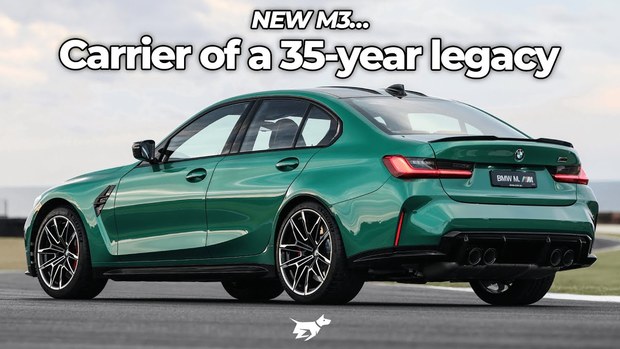
Choosing to launch a sports car in Australia at Phillip Island Grand Prix circuit is always a bold move: this is a big track with big speeds that honestly brings out the benefits – and vices – of any performance car.
The fact that was a choice made by BMW for the new M3 and M4 was a show of confidence in the new ‘G80’ and ‘G82’ shape of these vehicles – new from the ground up, based on BMW’s modular Cluster Architecture rear-drive platform, and sporting a new engine only seen previously in the X3 and X4 M SUVs.
Concept aside, there is little relation to the F80 and F82 M3 and M4 that came before – vehicles that sold better than any two- or four-door M3 that preceded them.
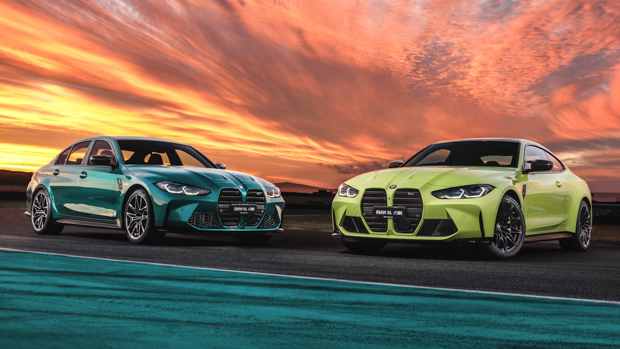
And in many ways that is a good thing, because while the previous shape was aesthetically handsome and absolutely fast, the ride left much to be desired – as did the seemingly neutered steering. The ‘CS’ versions that came later helped, but the base cars never felt like they hit their true potential.
So, do the 2021 M3 and M4 swing back toward the dynamic highs this badge is reputed for? Well, only a future road drive will tell the full story.
For now, though, we headed out on track at Phillip Island in the M3 Competition ($154,900) and two-door M4 Competition ($159,900), and pored over the vehicle in pit lane, to get some fast first impressions.
The cars we drove were the new Competition variant. The M3 and M4 Competition are the full fat versions of the new pair – well, until the more or less inevitable arrival of CS versions later in the life of the G80/G82 chassis.
That means the new ‘S58’ three-litre twin-turbo straight six petrol engine is producing 375kW of power and 650Nm of torque: enough to best the outputs of the 2.9-litre Alfa Romeo Giulia Quadrifoglio – if not quite the 700Nm of torque spat out by the V8-powered AMG C63 S. Either way, this pair are much faster than the six-pot M340i and M440i they sit above within their respective ranges.
There has been a switch in auto gearbox philosophy with the new M3 and M4, with the adoption of a ZF eight-speed torque converter automatic replacing the quick-shifting M dual-clutch gearbox of the previous generation that demonstrated relatively poor functionality at low speed.
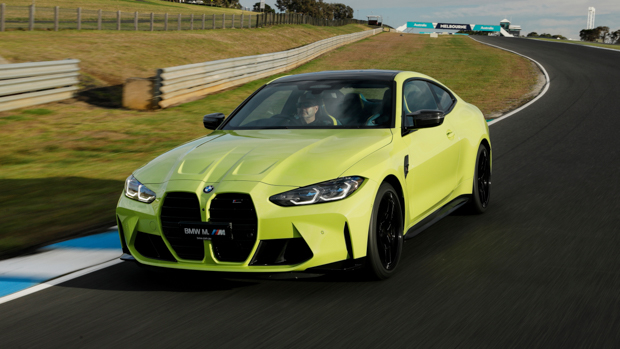
The 375kW Competition variants make the eight-speed auto a mandatory take – though if you’re alright with a bit less power and torque, the M3 and M4 are still available with a six-speed manual gearbox in ‘base’ – though still very well equipped – form.
The manual saves $10,000 compared to the Competition, but it is hardly a rehash of the previous-gen ‘Pure’ entry spec. No cloth seats here: no matter the grade you choose, the cabin is still extensively leather-lined and tech-packed.
Manual M3 and M4 cars are still on boats to Australia, so we’ll reserve our judgment on their capability for another review.
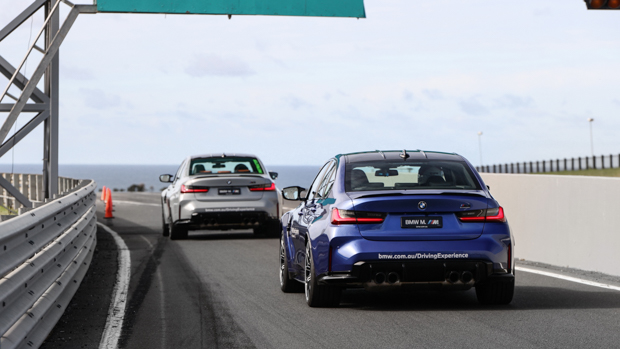
At least on track, the combination of the new S58 motor and eight-speed auto seems to have been recalibrated since that blend launched in the X3 and X4 M sports SUVs about 18 months ago.
We found those cars to demonstrate quite severe lag off the line as the turbos spooled up, before raining in with a torrent of torque at about 3,000rpm. The engine appears to have been massaged in this application, though a road drive will be more revealing.
Either way, it’s a potent combination on a big, fast and roomy track like Phillip Island. Rapid is the only word: 0-100km/h comes up in an official 3.9 seconds for the M3 Competition, though it feels a little quicker again.
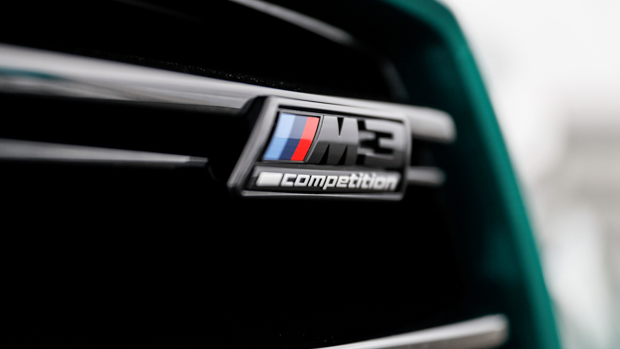
But it’s really a story of the S58’s girthy torque band that sees the M3 and M4 equipped with more flexibility than ever before. Even if you’ve selected a gear or two too high, these cars are seriously forgiving and pull with alacrity.
And if you leave the auto-box to its own devices, it’s intuitive and keeps you in the right gear for the situation regardless. Just like with the old M-DCT gearbox, the aggression of the shifts can be altered, and we found the middle configuration to be about right for our tastes.
The new M3 and M4 also sound engaging with a classic straight-six soundtrack in the cabin – though how much of this is synthesised isn’t known. Probably quite a bit: the S58 is compliant with the latest round of European emissions regulations. But honestly, we’re a bit over caring about synthesised noise. It sounds good while you’re driving it.
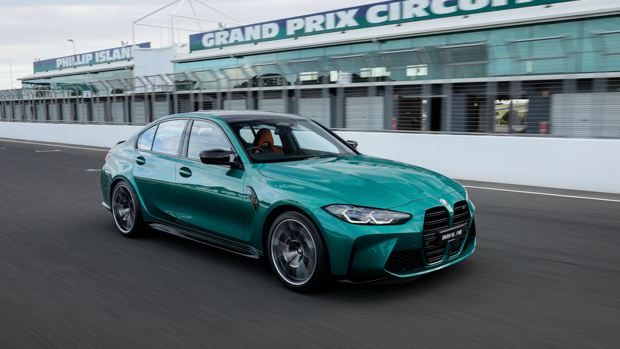
Happily, plenty of attention has been paid to the steering of the new M3 and M4, which is more feelsome and less artificial than the rack in the cars being replaced.
Just like the underlying G20 and G22 3 Series and 4 Series, the new M3 and M4 benefit from an extra decade or so of electric power steering know-how. The ratio is still quick but the steering feeds in linearly and there is more precision on display here, helping to rapidly build driver confidence.
But why the wheel needs to be so big – and thick-rimmed – we have no idea!
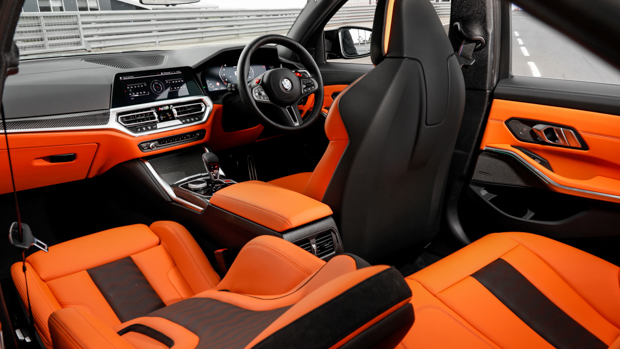
To be sure, the steering is assisted by high grip levels from the tyres, which on the Competition variant, are now very wide. There is a staggered arrangement, with 285/30 R20 at the rear, and 275/35 R19 at the front.
That said, the car does take a moment longer to settle once turned in, largely due to there being quite a weight increase here: about 170kg for the M3 Competition compared to the last generation, which slightly blunts crispness and agility at the limit.
The cars we drove were predominantly fitted with BMW’s M carbon braking system and we noted no fade despite repeated stops from speeds over 200km/h.
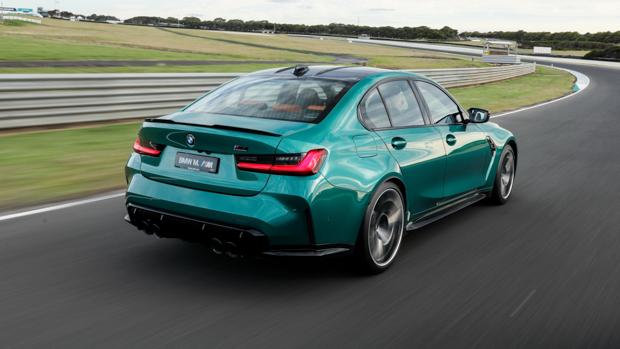
Unsurprisingly, there are few bumps on the Phillip Island circuit surface – aside from ripple strips – so we’ll wait for a proper road drive to comment on the ride quality of the vehicle.
However, the car remains well centred, with body motion controlled well by the steel springs and adaptive dampers. We found the middling Sport damper setting to be the most appropriate, giving the car a small amount of lean in the corners to assist the tyres but without the softer responses of the selectable Comfort damping.
Lovers of oversteer will appreciate the return of BMW’s M Dynamic Mode stability control setting, which allows a lairy amount of slip from the rear – but not enough give to allow the car to totally rotate, unless you’re really stupid with your inputs.
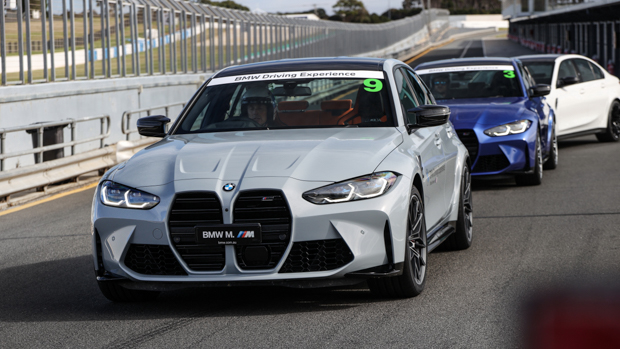
And that’s not to mention that early rumours that the M3 and M4 with an automatic gearbox would be AWD-only turned out to be false.
Rear wheel drive is the name of the game, at least for Australia, with both the ‘base’ manual and Competition automatic variants coming with RWD as standard. BMW’s ‘xDrive’ AWD system will become optionally available on the M3 and M4 later this year, however.
While our track test didn’t afford opportunities to test their efficacy directly, the M3 and M4 Competition come equipped with camera and radar based high-speed AEB, reversing AEB, lane centring, blind spot monitoring, rear cross traffic alert, front cross traffic alert, and a 360-degree camera.
If they work as well as they do on the underlying 3 Series, these will be some of the best-tuned safety systems in the industry right now.
However, it’s worth noting that if you opt for the manual gearbox, the cars lose some safety tech by way of the front radar being removed. The AEB reverts to partial braking in the manual cars as it relies on the camera alone.
Very good, in short.
BMW are on a roll with building interiors that are better laid-out than the competition – and build quality is also in a good place at the moment.
Just like the underlying 3 and 4 Series models, the M3 and M4 cabin is handsome but functional. Where the AMG C63 goes for an artier look with a cascading centre console, and Audi cabins increasingly relegate key functions to touchscreens, BMW cabins strike a near-perfect middle ground.
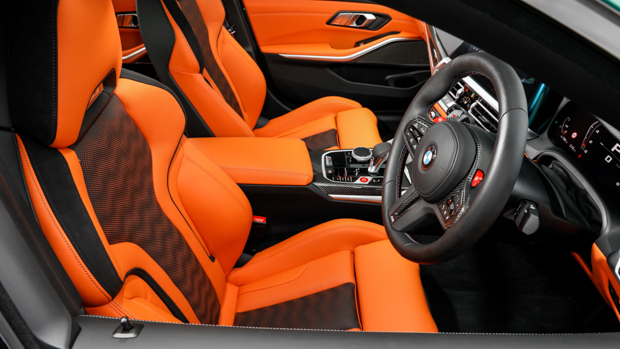
The amount of technology in here is right: it doesn’t overwhelm. There is still plenty of it: you get a bright 12.3-inch digital instrument cluster and a sharp, bright 10.25-inch touchscreen in the centre – but BMW have intelligently retained the physical, rotary iDrive controller that makes interacting with the software much easier (and safer) in the real world.
The screens run BMW’s seventh-gen iDrive operating system, and it generally works well, with clear, big targets and an intuitive interface. The voice control is almost flawless, and the inclusion of wireless Apple CarPlay and Android Auto gets a tick.
Toys like the interactive Drift Mode are also fun, with the screen able to present data on the quality, distance and duration of slides…
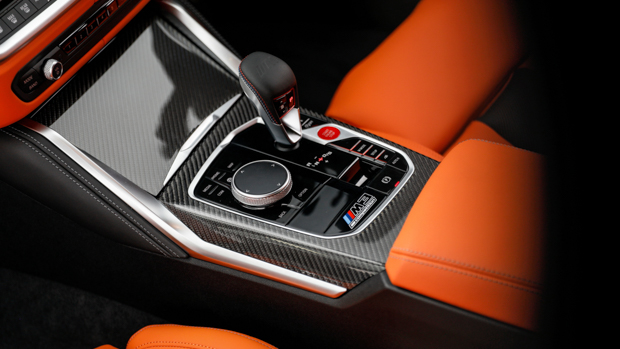
Most importantly, important functions like volume and climate control still retain clear buttons. Other manufacturers feel this stuff is old fashioned – we think BMW are in the right.
Four interior colour schemes are available for the M3 and M4, with the only difference really being the door length – as a two-door car, the M4 is less flexible but still offers space for two in the rear. The M3 is a four door, five seater car.
The Competition scores Merino leather available in black, and a variety of two-tone schemes: grey and black, orange-tan and black or blue and black with yellow highlights. The latter is the ‘hero’ scheme for the M4, and it will certainly appeal to some – but it’s a lot.
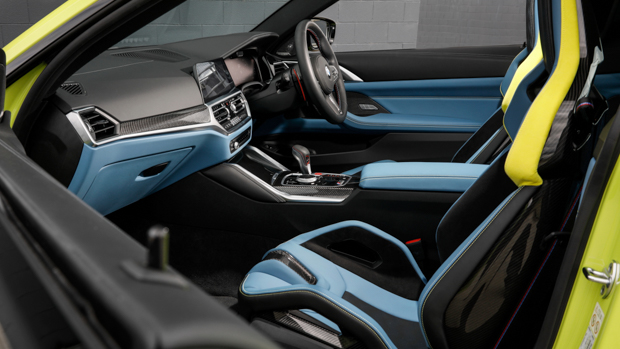
Further, the trims throughout the car sport your choice of carbon fibre, aluminium, carbon fibre, or open-pore wood.
Those seeking the full effect can option the M Carbon Package ($20,000) which – aside from adding carbon ceramic brakes outside, plus exterior carbon elements – switches out the front seats for serious carbon buckets, those these still retain creature comforts like standard electric adjustment.
In addition, the Competition variant scores full Merino leather on the dash top and door tops, lending the M3 and M4 an unexpectedly plush air inside.
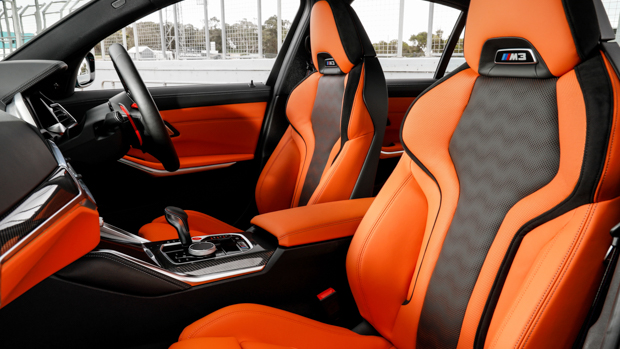
Even the basic seats offer excellent levels of support and comfort, though, with BMW’s traditional adjustable bolsters included as standard. The range of adjustment is excellent and the seat drops properly low – so low our view out was obscured by the cowling, so we had to jack the seat up a bit.
The back seats offer more room than in the previous generation – this is a longer car with better packaging.
The M3 is the option to go for if you’re going to actually use the second row, though – or you could wait for the forthcoming M3 Touring. The ‘G81’ will be the first time BMW has offered a true factory-built M3 station wagon, and it is coming to Australia.
Our first impressions taken from an extensive track drive of the BMW M3 Competition and BMW M4 Competition leave us impressed and waiting for the true pressure test – a road drive.
Australian roads are famously fickle, understood by suspension engineers as some of the most challenging surfaces in the world.
Where the AMG C63 S is a little too stiff for Australia, the Audi RS5 Sportback feels right at home – but where will the new BMW M3 and M4 fit in?
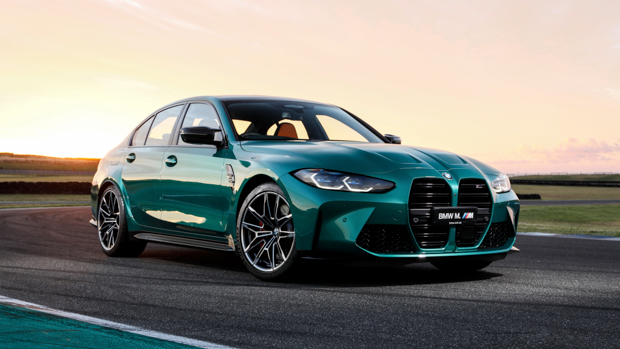
Only an in-depth road drive will provide answers, and our rating on this review relates to the track component only.
We also await drives of the standard M3 and M4 with a manual gearbox to see whether that more affordable specification is the true value buy of the range.
Variant tested COMPETITION
Key specs (as tested)
About Chasing cars
Chasing Cars reviews are 100% independent.
Because we are powered by Budget Direct Insurance, we don’t receive advertising or sales revenue from car manufacturers.
We’re truly independent – giving you Australia’s best car reviews.
The estimate provided does not take into account your personal circumstances but is intended to give a general indication of the cost of insurance, in order to obtain a complete quote, please visit www.budgetdirect.com.au. Estimate includes 15%^ online discount.
^Conditions Apply
Budget Direct Insurance arranged by Auto & General Services Pty Ltd ACN 003 617 909(AGS) AFSL 241 411, for and on behalf of the insurer, Auto & General Insurance Company Limited(ABN 42 111 586 353, AFSL 285 571).Because we don’t know your financial needs, we can’t advise you if this insurance will suit you. You should consider your needs and the Product Disclosure Statement before making a decision to buy insurance. Terms and conditions apply.
Indicative quote based on assumptions including postcode , 40 year old male with no offences, licence suspensions or claims in the last 5 years, a NCD Rating 1 and no younger drivers listed. White car, driven up to 10,000kms a year, unfinanced, with no modifications, factory options and/or non-standard accessories, private use only and garaged at night.
^Online Discounts Terms & Conditions
1. Discounts apply to the premium paid for a new Budget Direct Gold Comprehensive Car Insurance, Third Party Property Only or Third Party Property, Fire & Theft Insurance policy initiated online on or after 29 March 2017. Discounts do not apply to optional Roadside Assistance.
2. Discounts do not apply to any renewal offer of insurance.
3. Discounts only apply to the insurance portion of the premium. Discounts are applied before government charges, taxes, levies and fees, including instalment processing fees (as applicable). The full extent of discounts may therefore be impacted.
4. We reserve the right to change the offer without notice.